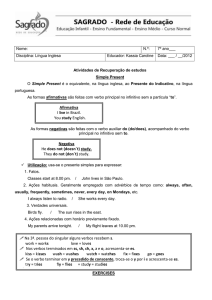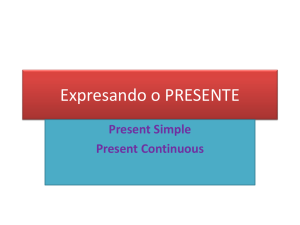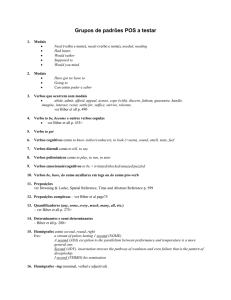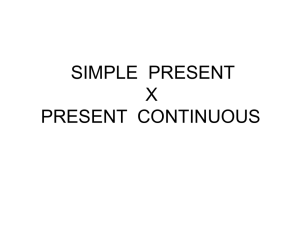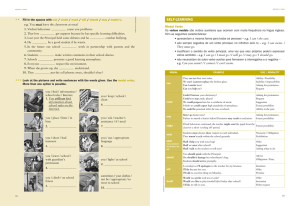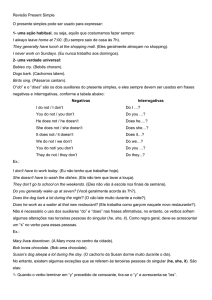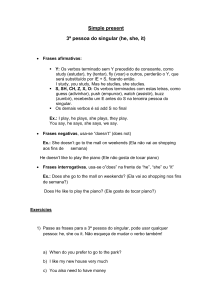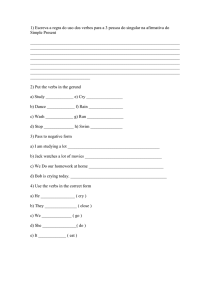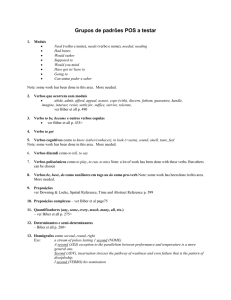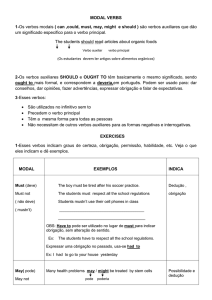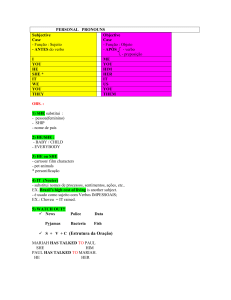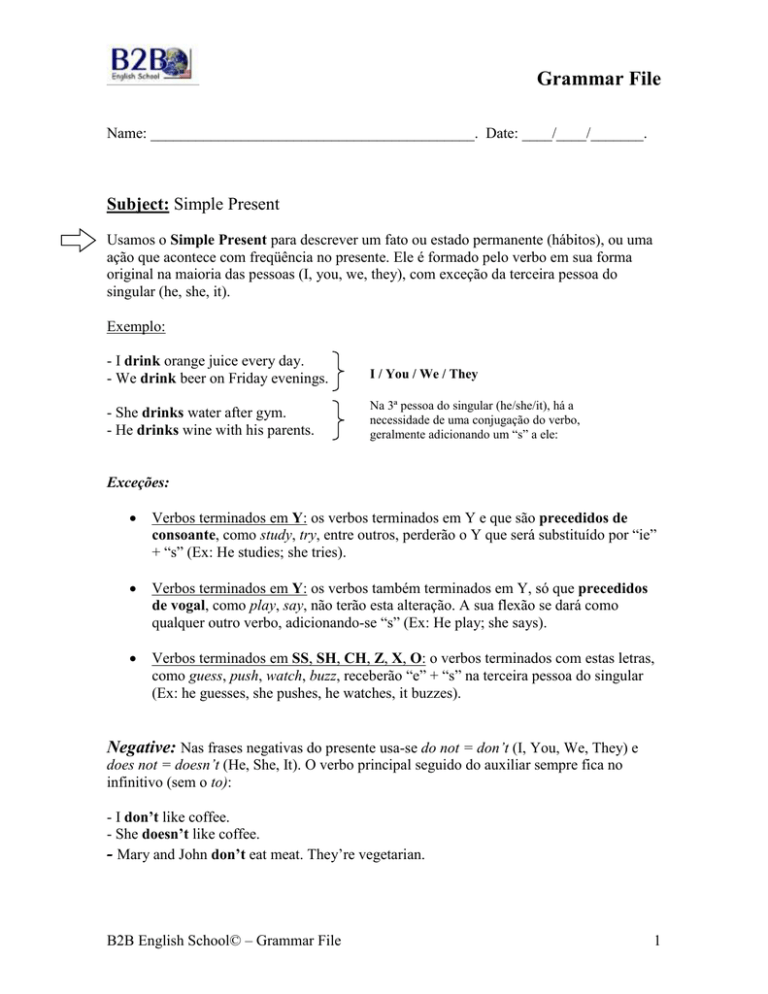
Grammar File
Name: ___________________________________________. Date: ____/____/_______.
Subject: Simple Present
Usamos o Simple Present para descrever um fato ou estado permanente (hábitos), ou uma
ação que acontece com freqüência no presente. Ele é formado pelo verbo em sua forma
original na maioria das pessoas (I, you, we, they), com exceção da terceira pessoa do
singular (he, she, it).
Exemplo:
- I drink orange juice every day.
- We drink beer on Friday evenings.
I / You / We / They
- She drinks water after gym.
- He drinks wine with his parents.
Na 3ª pessoa do singular (he/she/it), há a
necessidade de uma conjugação do verbo,
geralmente adicionando um “s” a ele:
Exceções:
Verbos terminados em Y: os verbos terminados em Y e que são precedidos de
consoante, como study, try, entre outros, perderão o Y que será substituído por “ie”
+ “s” (Ex: He studies; she tries).
Verbos terminados em Y: os verbos também terminados em Y, só que precedidos
de vogal, como play, say, não terão esta alteração. A sua flexão se dará como
qualquer outro verbo, adicionando-se “s” (Ex: He play; she says).
Verbos terminados em SS, SH, CH, Z, X, O: o verbos terminados com estas letras,
como guess, push, watch, buzz, receberão “e” + “s” na terceira pessoa do singular
(Ex: he guesses, she pushes, he watches, it buzzes).
Negative: Nas frases negativas do presente usa-se do not = don’t (I, You, We, They) e
does not = doesn’t (He, She, It). O verbo principal seguido do auxiliar sempre fica no
infinitivo (sem o to):
- I don’t like coffee.
- She doesn’t like coffee.
- Mary and John don’t eat meat. They’re vegetarian.
B2B English School© – Grammar File
1
Grammar File
Interrogative: As frases interrogativas são formadas colocando-se do ou does no início
das perguntas sendo precedidos apenas por pronomes interrogativos (wh_ words...). O
verbo principal sempre fica no infinitivo (sem o to). Nas respostas curtas, do/don’t,
does/doesn’t substituem o verbo principal:
- Do you like hamburguers?
- Does she usually go to the gym?
- What time do you usually go to work?
- Where do you work?
- Do you speak English? - Yes, I do. (speak)
- Does she enjoy parties? -Yes, she does. (enjoys)
- Does he take the 10:00 AM train? - No, he doesn’t. (take)
POSITIVE
I work at Eltek
NEGATIVE
I don’t work at Eltek
INTERROGATIVE
Do I work at Eltek?
You work at Eltek
You don’t work at Eltek
Do you work at Eltek?
He works at Eltek
He doesn’t at Eltek
Does he work at Eltek?
She works at Eltek
She doesn’t work at Eltek
Does she work at Eltek?
It works at Eltek
It doesn’t work at Eltek
Does it work at Eltek?
We work at Eltek
We don’t work at Eltek
Do we work at Eltek?
You work at Eltek
You don’t work at Eltek
Do you work at Eltek?
They work at Eltek
They don’t work at Eltek
Do they work at Eltek?
Exercises:
1. Complete the text below with the correct form of the verbs, in the Simple Present.
Kristin _______________ (wake up) everyday at 7. She _______________ (brush) her
teeth and then _______________ (take) a shower. Then she _______________ (meet)
with her friend Jennifer and together they _______________ (have) breakfast at a little
diner near the office. They _______________ (go) to the office at around 8:30. Kristin
_______________ (go) to the first floor, where she _______________ (work), and
Jennifer _______________ (take) the elevator to the 11th floor, where her office
_______________ (be). Later, they _______________ (meet) again at 12 to have lunch.
B2B English School© – Grammar File
2
Grammar File
2. Complete the text below with the correct form of the verbs in the box (in the Simple
Present).
leave
meet
read
discuss
watch
take
talk
wait
take
do
have
wake up
go
Jessica _______________ every morning at 6:30. She _______________ a shower
and then _______________ to the kitchen to make her breakfast. She usually
_______________ just a cup of tea and some toasted bread. She _______________
home at about 7:40, to the bus stop and _______________ for her bus to arrive.
When she gets to work, she _______________ her e-mails on the computer, and then
she usually goes to a meeting with other employees. During the meeting, they all
_______________ what they have to do that day. Jessica _______________ a lot of
reports for her boss, and she also _______________ to her clients to try and solve their
problems.
At 6.00, Jessica leaves the office and _____________ another bus to go home. She
_______________ TV every night, and sometimes she also _______________ with
some friends to have drinks somewhere.
B2B English School© – Grammar File
3

